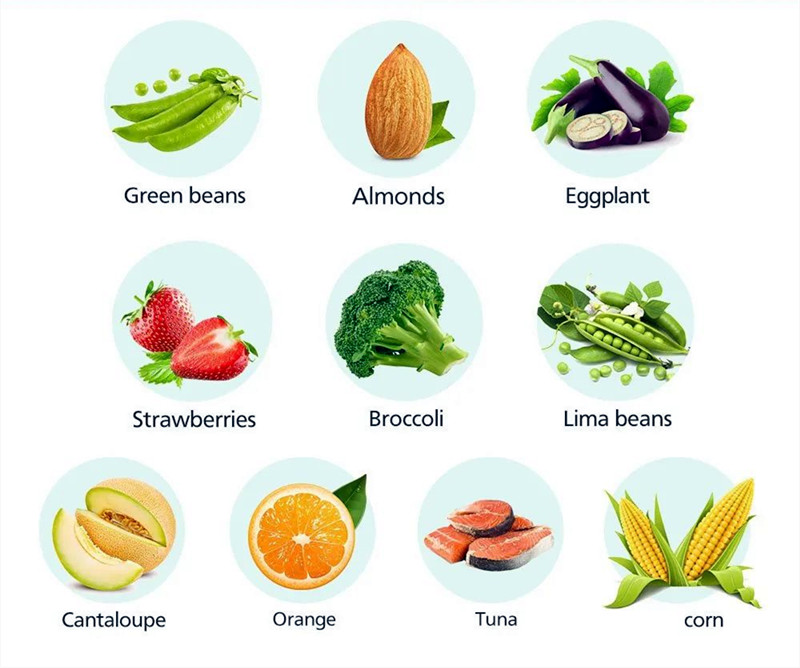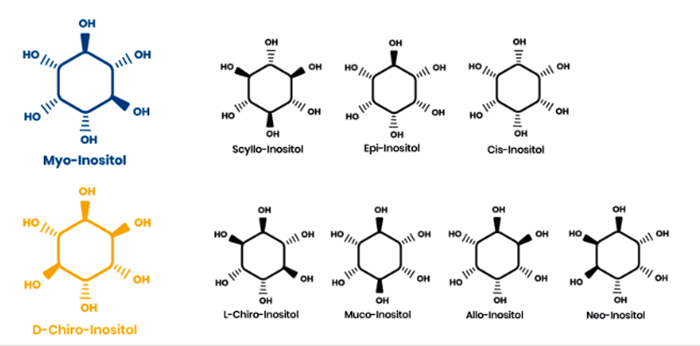Inositol, or more precisely myo-inositol, is a peculiar class of natural metabolites (defined as sugar alcohols), chiral hexahydroxycyclohexane, belonging to the B vitamin family found in the body and food. It is a naturally occurring substance, considered to be a pseudo vitamin.
Inositol is found in foods such as cereals with high bran content, nuts, beans and fruit. It also forms a group of compounds, called the phytates, which act as phosphate stores in seeds and are a common feature in plants. It can be used to add to water, smoothies, juice, or coffee. It has a sweet flavor and is easy to mix. It supports mood balance and has been studied in anxiety, OCD, and eating disorders related to bingeing, promotes healthy glucose metabolism and hormone regulation and has been shown to improve ovulatory function and fertility in women with PCOS. Today here we will introduce the health benefits of Inositol for women.
Fig above: Food rich in Inositol
Structure of Inositol
The inositols are cyclohexane-ring polyols having hydroxy groups bound to each carbon, they are known under the term cyclitols and their derivatives. It exists as 9 optically active isomers, among them myo-, scyllo-, muco-, neo- and d-chiro inositols. Inositol is a component of the cell membranes, and is the structural basis of many secondary messengers in eukaryotic cells, including inositol phosphates such as phosphatidylinositol phosphate (PIP) lipids. It has a chemical structure similar to glucose and helps with hormone, growth factor, and neurotransmitter signaling.
Benefits of inositol for woman
Inositol mental wellness
For a long time, inositol was considered vitamin B8, but it is now known to be a semi-essential nutrient since it can be made by the body. It is also known to be a component of neurotransmitters, which relay messages between billions of brain cells that affect everything from mood to metabolism, stress management, memory, and sleep. Inositol powder is used as a dietary supplement to support emotional and mental wellness, aiding the activity of neurotransmitter messaging systems. Inositol helps with anxiety and depression by increasing the synthesis of serotonin and dopamine. It is often employed to help mitigate symptoms of anxiety, panic and obsessive-compulsive disorders, and to promote restful sleep. It can also help treat symptoms of panic disorder, including accelerated heartbeat, breathlessness, and dizziness.
Inositol may help with losing weight
Inositolide also helps with weight loss, by balancing the hormones that control appetite and satiety. Some people report that it helps them lose more weight on a calorie-controlled diet, and some even say they feel less hungry while taking it.
Inositol is effective for PCOS
Inositol has been shown to be as effective as Metformin in lowering blood glucose levels and improving insulin sensitivity. It is an important part of the phospholipids that make up cell membranes and helps establish healthy cell structures which facilitate nerve impulses. It is used for lipid metabolism, promoting fat absorption and the utilization of vitamins in the liver and other tissues, adjuvant therapy for hyperlipidemia. Inositol is also used by women to promote ovarian health and aid in normal blood sugar maintenance, especially with Polycystic Ovary Syndrome. It may also aid in balancing hormones and maintaining healthy glucose metabolism, as well as supporting ovulation in women with polycystic ovary syndrome.
Polycystic ovary syndrome, commonly known as PCOS, is a menstrual disorder characterized by insulin resistance and fertility problems. Although symptoms vary widely among women with PCOS, almost all women will experience insulin resistance as part of their condition. As a safe and effective additional treatment option for PCOS and fertility, inositol supplementation has become increasingly popular. Inositol acts like insulin in the body and can effectively lower blood sugar levels after a meal. High levels of insulin have been linked to difficult pregnancies, early pregnancy and miscarriage. Inositol is involved in the chemical information that embryonic cells need to grow and develop. For a successful pregnancy, embryonic cells need the right conditions in the womb to grow and divide, eventually forming a fetus. Insulin is released by the pancreas in response to glucose from carbohydrates in food. It’s a natural process where insulin helps glucose enter cells and muscles for energy or to store energy in fat. Insulin resistance is a condition in which the insulin produced by the body cannot carry all the blood sugar into the cells, causing insulin and glucose levels in the blood to rise, which has a negative impact on fertility. When there is too much insulin in the body, it directly affects hormones such as estrogen, which are necessary for fertility and healthy pregnancy; It can also negatively affect the environment of the lining of the uterus, which can affect the ability of eggs to implant in the uterus. Insulin resistance can also directly affect a woman’s ability to ovulate, which is crucial for conception.
Dosage of inositol for woman
The FDA does not currently regulate inositol as a dietary supplement and does not have precise dosage recommendations. A daily supplement of 4,000 mg is generally recommended to also help delay the onset of gestational diabetes in insulin-resistant women. Some studies use a combination of inositol and folic acid, an important B vitamin in early pregnancy. Side effects are rare and minimal, but may include nausea, tiredness, headache and dizziness. Consult your GP before taking Inositol if you are pregnant or breastfeeding. It may interact with some medications, especially insulin-lowering drugs.
- Dandelion Extract: What It Is, Benefits, Uses and Side Effect - April 23, 2024
- Is Berberine Extract Help For Weight Loss? - April 11, 2024
- Why Is Pysllium Husk Powder A Popular Meal Replacement Ingredient? - April 3, 2024




